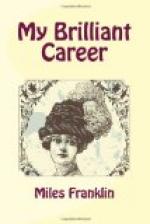“Silence, you ignorant old creature! How dare you have the incomparable impertinence to mention my name in conjunction with that of your boor of a son. Though he were a millionaire I would think his touch contamination. You have fallen through for once if you imagine I go out at night to meet any one—I merely go away to be free for a few minutes from the suffocating atmosphere of your odious home. You must not think that because you have grasped and slaved and got a little money that it makes a gentleman of you; and never you dare to again mention my name in regard to matrimony with any one about here;” and with my head high and shoulders thrown back I marched to my room, where I wept till I was weak and ill.
This monotonous sordid life was unhinging me, and there was no legitimate way of escape from it. I formed wild plans of running away, to do what I did not care so long as it brought a little action, anything but this torturing maddening monotony; but my love for my little brothers and sisters held me back. I could not do anything that would put me for ever beyond the pale of their society.
I was so reduced in spirit that had Harold Beecham appeared then with a matrimonial scheme to be fulfilled at once, I would have quickly erased the fine lines I had drawn and accepted his proposal; but he did not come, and I was unacquainted with his whereabouts or welfare. As I remembered him, how lovable and superior he seemed in comparison with the men I met nowadays: not that he was any better than these men in their place and according to their lights, but his lights—at least not his lights, for Harold Beecham. was nothing of a philosopher, but the furniture of the drawing-room which they illuminated—was more artistic. What a prince of gentlemanliness and winning gallantries he was in his quiet way!
This information concerning him was in a letter I received from my grandmother at Easter:
Who should surprise us with a visit the other day but Harold Beecham. He was as thin as a whipping-post, and very sunburnt [I smiled, imagining it impossible for Harold to be any browner than of yore]. He has been near death’s door with the measles—caught them in Queensland while droving, and got wet. He was so ill that he had to give up charge of that 1600 head of cattle he was bringing. He came to say good-bye to us, as he is off to Western Australia next week to see if he can mend his fortunes there. I was afraid he was going to be like young Charters, and swear he would never come back unless he made a pile, but he says he will be back next Christmas three years for certain, if he is alive and kicking, as he says himself.
Why he intends returning at that stipulated time I don’t know, as he never was very communicative, and is more unsociable than ever now. He is a man who never shows his feelings, but he must feel the loss of his old position deeply. He seemed surprised not to find you here, and says it was a pity to set you teaching, as it will take all the life and fun out of you, and that is the first time I ever heard him express an opinion in any one’s business but his own. Frank Hawden sends kind regards, &c.




